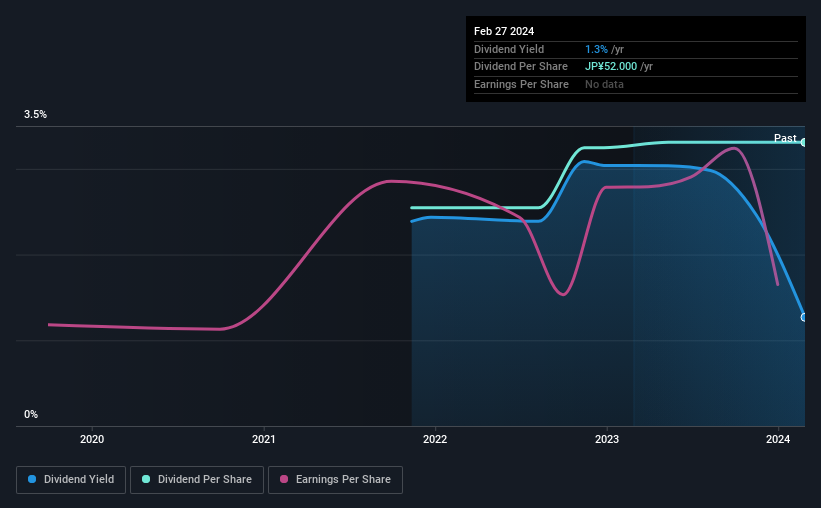
The board of Japan Ecosystem Co., Ltd. (TSE:9249) has announced that it will pay a dividend of ¥26.00 per share on the 29th of May. This takes the annual payment to 1.3% of the current stock price, which is about average for the industry.
While the dividend yield is important for income investors, it is also important to consider any large share price moves, as this will generally outweigh any gains from distributions. Investors will be pleased to see that Japan Ecosystem's stock price has increased by 150% in the last 3 months, which is good for shareholders and can also explain a decrease in the dividend yield.
See our latest analysis for Japan Ecosystem
Japan Ecosystem's Dividend Is Well Covered By Earnings
Solid dividend yields are great, but they only really help us if the payment is sustainable. Before making this announcement, Japan Ecosystem was easily earning enough to cover the dividend. This means that most of its earnings are being retained to grow the business.
Over the next year, EPS could expand by 6.3% if recent trends continue. Assuming the dividend continues along recent trends, we think the payout ratio could be 30% by next year, which is in a pretty sustainable range.

Japan Ecosystem Is Still Building Its Track Record
The company has maintained a consistent dividend for a few years now, but we would like to see a longer track record before relying on it. Since 2022, the dividend has gone from ¥40.00 total annually to ¥52.00. This means that it has been growing its distributions at 14% per annum over that time. The dividend has been growing rapidly, however with such a short payment history we can't know for sure if payment can continue to grow over the long term, so caution may be warranted.
The Dividend Has Growth Potential
Investors who have held shares in the company for the past few years will be happy with the dividend income they have received. We are encouraged to see that Japan Ecosystem has grown earnings per share at 6.3% per year over the past five years. Growth in EPS bodes well for the dividend, as does the low payout ratio that the company is currently reporting.
In Summary
Overall, it's great to see the dividend being raised and that it is still in a sustainable range. The payout ratio looks good, but unfortunately the company's dividend track record isn't stellar. This looks like it could be a good dividend stock going forward, but we would note that the payout ratio has been at higher levels in the past so it could happen again.
Companies possessing a stable dividend policy will likely enjoy greater investor interest than those suffering from a more inconsistent approach. Still, investors need to consider a host of other factors, apart from dividend payments, when analysing a company. For example, we've identified 5 warning signs for Japan Ecosystem (1 shouldn't be ignored!) that you should be aware of before investing. Is Japan Ecosystem not quite the opportunity you were looking for? Why not check out our selection of top dividend stocks.
New: Manage All Your Stock Portfolios in One Place
We've created the ultimate portfolio companion for stock investors, and it's free.
• Connect an unlimited number of Portfolios and see your total in one currency
• Be alerted to new Warning Signs or Risks via email or mobile
• Track the Fair Value of your stocks
Have feedback on this article? Concerned about the content? Get in touch with us directly. Alternatively, email editorial-team (at) simplywallst.com.
This article by Simply Wall St is general in nature. We provide commentary based on historical data and analyst forecasts only using an unbiased methodology and our articles are not intended to be financial advice. It does not constitute a recommendation to buy or sell any stock, and does not take account of your objectives, or your financial situation. We aim to bring you long-term focused analysis driven by fundamental data. Note that our analysis may not factor in the latest price-sensitive company announcements or qualitative material. Simply Wall St has no position in any stocks mentioned.
About TSE:9249
Japan Ecosystem
Engages in environmental, transportation infrastructure, and other businesses.
Proven track record with adequate balance sheet.
Market Insights
Community Narratives



